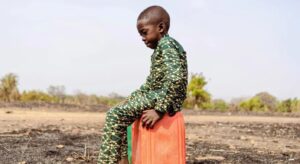 A recent study by scientists from Vrije Universiteit Brussel (VUB) and Environment and Climate Change Canada (ECCC) reveals that children born today are poised to experience an unprecedented number of climate extremes throughout their lifetimes. These extremes include heatwaves, floods, wildfires, droughts, and tropical cyclones, occurring more frequently and with greater intensity than in previous generations.
A recent study by scientists from Vrije Universiteit Brussel (VUB) and Environment and Climate Change Canada (ECCC) reveals that children born today are poised to experience an unprecedented number of climate extremes throughout their lifetimes. These extremes include heatwaves, floods, wildfires, droughts, and tropical cyclones, occurring more frequently and with greater intensity than in previous generations.
Key Findings
Generational Disparity: The study introduces the concept of an “unprecedented life,” indicating that without climate change, the likelihood of experiencing such a high number of extreme events would be less than 1 in 10,000. Children born in 2020 are significantly more likely to live such lives compared to those born in 1960.
- Impact of Warming Scenarios:
- If warming reaches 3.5°C, this figure escalates to over 90%.
- Under a 1.5°C warming scenario, over 50% of children born in 2020 will face unprecedented heat wave exposure.
- Geographical Inequities: Children in tropical regions are particularly vulnerable, even under the 1.5°C scenario. These areas are expected to experience more severe climate extremes, exacerbating existing vulnerabilities.
- Socioeconomic Disparities: The study highlights that 95% of the most socioeconomically disadvantaged children born in 2020 will endure unprecedented heat wave exposure, compared to 78% among the least disadvantaged. This underscores the intersection of climate vulnerability and socioeconomic status.
Urgent Need for Action
The findings arrive ahead of COP30 in Brazil, emphasizing the critical need for immediate and substantial reductions in greenhouse gas emissions. Without significant policy changes, the planet is on track for approximately 2.7°C of warming this century, posing severe risks to current and future generations.
Dr. Luke Grant, the study’s lead author, stresses that the younger the individual, the higher the likelihood of experiencing unprecedented climate extremes. This generational injustice calls for urgent global action to mitigate climate change and protect the most vulnerable populations.
Source: Earth.Com
